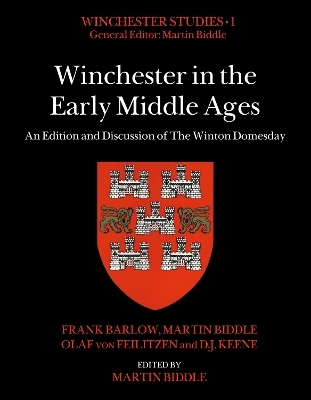
Winchester in the Early Middle Ages
An Edition and Discussion of The Winton Domesday
Seiten
2024
Archaeopress Archaeology (Verlag)
978-1-80327-016-6 (ISBN)
Archaeopress Archaeology (Verlag)
978-1-80327-016-6 (ISBN)
- Titel z.Zt. nicht lieferbar
- Versandkostenfrei innerhalb Deutschlands
- Auch auf Rechnung
- Verfügbarkeit in der Filiale vor Ort prüfen
- Artikel merken
This volume provides a full edition, translation, and analyses of the Winton Domesday and of the city depicted therein, drawing on the evidence derived from archaeological excavation and historical research in the city since 1961, on personal- and place-name evidence, and on contemporary advances in Anglo-Saxon numismatics.
London and Winchester were not described in the Domesday Book, but the royal properties in Winchester were surveyed for Henry I about 1110 and the whole city was surveyed for Bishop Henry of Blois in 1148. These two surveys survive in a single manuscript, known as the Winton Domesday, and constitute the earliest and by far the most detailed description of an English or European town of the early Middle Ages. In the period covered Winchester probably achieved the peak of its medieval prosperity. From the reign of Alfred to that of Henry II it was a town of the first rank, initially centre of Wessex, then the principal royal city of the Old English state, and finally `capital’ in some sense, but not the largest city, of the Norman Kingdom. This volume provides a full edition, translation, and analyses of the surveys and of the city they depict, drawing on the evidence derived from archaeological excavation and historical research in the city since 1961, on personal- and place-name evidence, and on the recent advances in Anglo-Saxon numismatics.
London and Winchester were not described in the Domesday Book, but the royal properties in Winchester were surveyed for Henry I about 1110 and the whole city was surveyed for Bishop Henry of Blois in 1148. These two surveys survive in a single manuscript, known as the Winton Domesday, and constitute the earliest and by far the most detailed description of an English or European town of the early Middle Ages. In the period covered Winchester probably achieved the peak of its medieval prosperity. From the reign of Alfred to that of Henry II it was a town of the first rank, initially centre of Wessex, then the principal royal city of the Old English state, and finally `capital’ in some sense, but not the largest city, of the Norman Kingdom. This volume provides a full edition, translation, and analyses of the surveys and of the city they depict, drawing on the evidence derived from archaeological excavation and historical research in the city since 1961, on personal- and place-name evidence, and on the recent advances in Anglo-Saxon numismatics.
Martin Biddle is an Emeritus Fellow of Hertford College, Oxford, and Honorary Fellow of Pembroke College, Cambridge. He was the first Lecturer in Medieval Archaeology in England, at the University of Exeter (1963–67) and has held many other distinguished academic positions worldwide. He is the Founder and Director of the Winchester Excavations Committee (1962–present) and the Winchester Research Unit (1968–present). Professor Biddle is also Chairman of the Fabric Advisory Committee (FAC) for Winchester Cathedral, Archaeological Consultant for St Albans Cathedral, and former Archaeological Consultant for Canterbury Cathedral. In June 2014, he was awarded a CBE for ‘services to archaeology’.
| Erscheint lt. Verlag | 31.10.2024 |
|---|---|
| Reihe/Serie | Winchester Studies |
| Verlagsort | Oxford |
| Sprache | englisch |
| Maße | 215 x 276 mm |
| Gewicht | 1756 g |
| Themenwelt | Geisteswissenschaften ► Archäologie |
| Geschichte ► Allgemeine Geschichte ► Mittelalter | |
| ISBN-10 | 1-80327-016-0 / 1803270160 |
| ISBN-13 | 978-1-80327-016-6 / 9781803270166 |
| Zustand | Neuware |
| Informationen gemäß Produktsicherheitsverordnung (GPSR) | |
| Haben Sie eine Frage zum Produkt? |
Mehr entdecken
aus dem Bereich
aus dem Bereich
eine neue Geschichte des Mittelalters
Buch | Hardcover (2023)
C.H.Beck (Verlag)
38,00 €


